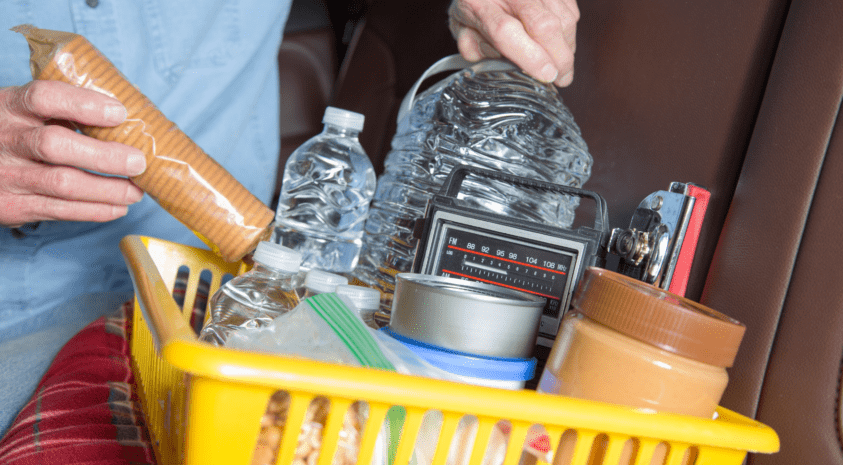With the recent water contamination scare in Philadelphia where residents panic bought water clearing out store shelves, to tornadoes to epic winter weather in California, always having a plan for significant emergency events is key. Not just for survival reasons but also peace of mind.
We’ve created the following list of tips to help you prepare for a weather or other type of community emergency in advance so you can focus on the bigger issues at hand during a stressful time.
1. Food and Water:
Having enough food and water for every member of your household (including pets) for 72 hours stored in your basement, garage or a shed is important in case you lose power or are housebound due to severe weather. This provides peace of mind so you’ll be able to carry on with meals whether or not you have heat. Make sure you choose shelf stable foods that aren’t high in sodium and if you have canned goods, have a non-electric can opener handy. Every six months, check your supplies and use up or donate foods that will be expiring in the next month or two and repurchase to replace that way you’ll always be ready for what comes your way.
2. Medicine and Hygiene Products:
We all remember the toilet paper hoarding during the pandemic. It’s a good idea to always have an extra stash of toilet paper and other hygiene products like baby wipes on hand in case water is shut off or you’re sheltering in place during a storm. Don’t forget prescription meds either. Talk to your doctor about having enough supply on hand for maintenance and other life-critical medications so you won’t be left without.
3. Tools and Electronics:
Most people now have smartphones for weather and emergency alerts. Make sure you have enough phone and laptop chargers for everyone in your household and keep phones fully charged when a known storm is headed your way. You may also want to consider buying a portable battery charger if you anticipate power being out for an extended period of time. If you get winter weather, make sure you have enough shovels or that your shovels are not broken or cracked. Make sure that your snow blower is serviced and has gas.
4. Pet Supplies:
Don’t forget your furry or feathered friends in an emergency and make sure you have enough food and water for them and any medications they take. Ensure that your pet has clean bedding and for anxious dogs and cats, it may be worth investigating an anxiety shirt or vest but first ask your vet what is best for your particular pet.
5. Clothing and Bedding:
Having sleeping bags for every member of your household in addition to blankets and comfortable clothing is important when you’re sheltering at home without heat. If you live in a hot climate, make sure you have light colored and natural fabrics that breathe. Depending on where you live, having the proper outdoor gear is important too whether that’s winter or rain gear.
6. Vehicle Emergency Kit:
It is important to have an emergency kit prepared for your vehicle either stored in the vehicle or in a garage, basement or other easily accessible location where you can grab it quickly. This should be a water tight and contain bottled water, non-perishable/shelf-stable food items, a flashlight, batteries, phone charger, first aid kit, blankets, pet supplies, even an extra change of clothing and other essentials for each member of your household.
7. Important Documents:
When a weather or other community emergency is pending that last thing on your mind may be documents but securing homeowners policy information, vehicle titles, passports, birth certificates and other important documents is critical for processing claims and for other reasons. Make sure your key documents are in a fireproof box or location where you can easily grab and take with you if needed or in a safe spot.
8. Family Emergency Plan:
Develop a plan with your family, outlining what each member should do in case of an emergency. This should include evacuation routes, shelter locations, and important contact information for each family member, such as phone numbers and email addresses.
9. Practice Your Plan:
Once you have a family emergency plan in place, practice it with your family regularly so everyone knows what to do in case of an emergency. This will help ensure that everyone knows their roles and is comfortable with the plan.
10. Know Your Evacuation Routes:
Familiarize yourself with the evacuation routes in your area and have alternative routes ready in case you need to evacuate with your family
11. Protect Your Home:
Before a weather emergency strikes, make sure that your home is secure by boarding up windows, sealing doors and securing outdoor items that may become projectiles if winds are expected. If large amounts of snow are involved, make sure your dryer vent is clear and all vents to your outside are cleared so you won’t end up with an emergency with carbon monoxide which can mimic other illness symptoms and can be deadly.
Bottom line is to always stay informed by keeping an eye on weather updates from the news, weather apps, and social media so you’re prepared for weather and other community emergencies. Make special note of weather alerts and warnings issued by the National Weather Service.
Struggling with processing a national tragedy? Please read our blog post on How to Cope with National Tragedy: 5 Ways to Help Process It.
We’re here for you!
Bankers Life is here to help customers with their financial and insurance needs so please visit us at BankersLife.com to learn more.



